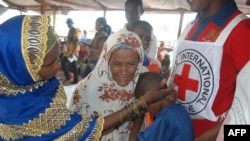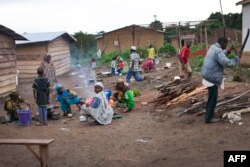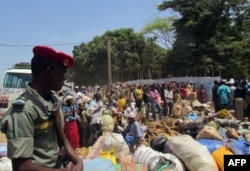Cameroon's government says resurging violence in the Central African Republic has driven another 20,000 refugees into Cameroon this year and prevented the approximately 300,000 C.A.R. refugees who were already in the country from going home. The recent influx has increased humanitarian needs and tensions in border areas of eastern Cameroon.
Seven hundred children attend the government primary school in the Timangolo refugee camp on Cameroon's eastern border with the Central African Republic. There were 500 students three months ago.
Cameroon's government says most of the new refugees arriving from C.A.R. this year are women and children.
Among them is 14-year-old Itna Issiaka, whose parents were killed in Bangui three years ago. Itna fled to Cameroon after her uncle, who was caring for her, was killed in August. Itna sits under a tree and refuses to go to class.
She says she feels traumatized when she remembers her friends who are suffering, like Rafiatou, who is still in Bangui.
Itna's teacher, Cecile Mvogo, says most of the children find it difficult to integrate into their new environment.
Refugee children from C.A.R. have difficulty understanding languages spoken in eastern Cameroon, such as French and Gbaya, Mvogo says, so she uses a kind of sign language to communicate and to make them feel more comfortable.
Security issues
The conditions in the camps sparse, and refugees complain of water and food shortages. The U.N. refugee agency said as of April, just 5 percent of the funding needed for the refugees this year had been pledged.
The government is pleading with donors to mobilize resources to help the refugees, said Rene Emmanuel Sadi, Cameroon's minister of territorial administration and decentralization.
Security issues have also contributed to tensions with host communities.
Last week, the government of Cameroon arrested 30 refugees accused of harvesting food from local farms. They were sent back to the camps and asked not to leave unless they were returning to their country.
In addition, residents and local officials say fighters from the Central African Republic use the border zone in eastern Cameroon as a staging ground. Armed men from C.A.R. have been accused of kidnapping residents for ransom or stealing cattle and money.
Businessmen
One group of young refugees, however, has found a way to run a business outside the camps.
They started their poultry farm on the outskirts of Moloundou with 15 chickens. Three years later, the farm has 400 birds and has hired five staff members, including one Cameroonian.
But it wasn't easy.
Their first effort was growing and selling vegetables, says Rigobert Abazene. However, some people drove them from the plot of land they had cleared in the bush.
They didn't give up.
Flavien Malaka, 21, who saw his parents and uncle killed before he escaped to Cameroon, said he and his business partners refused to compromise their futures and the future of their country by forgoing their educations. However, they needed money to pay for school. So, they built the poultry farm with sun-dried bricks they molded themselves.
Malaka is now a third-year political science student at Cameroon's Yaounde 2 University. The poultry farm earns enough money to pay the university fees for all 10 young men.








